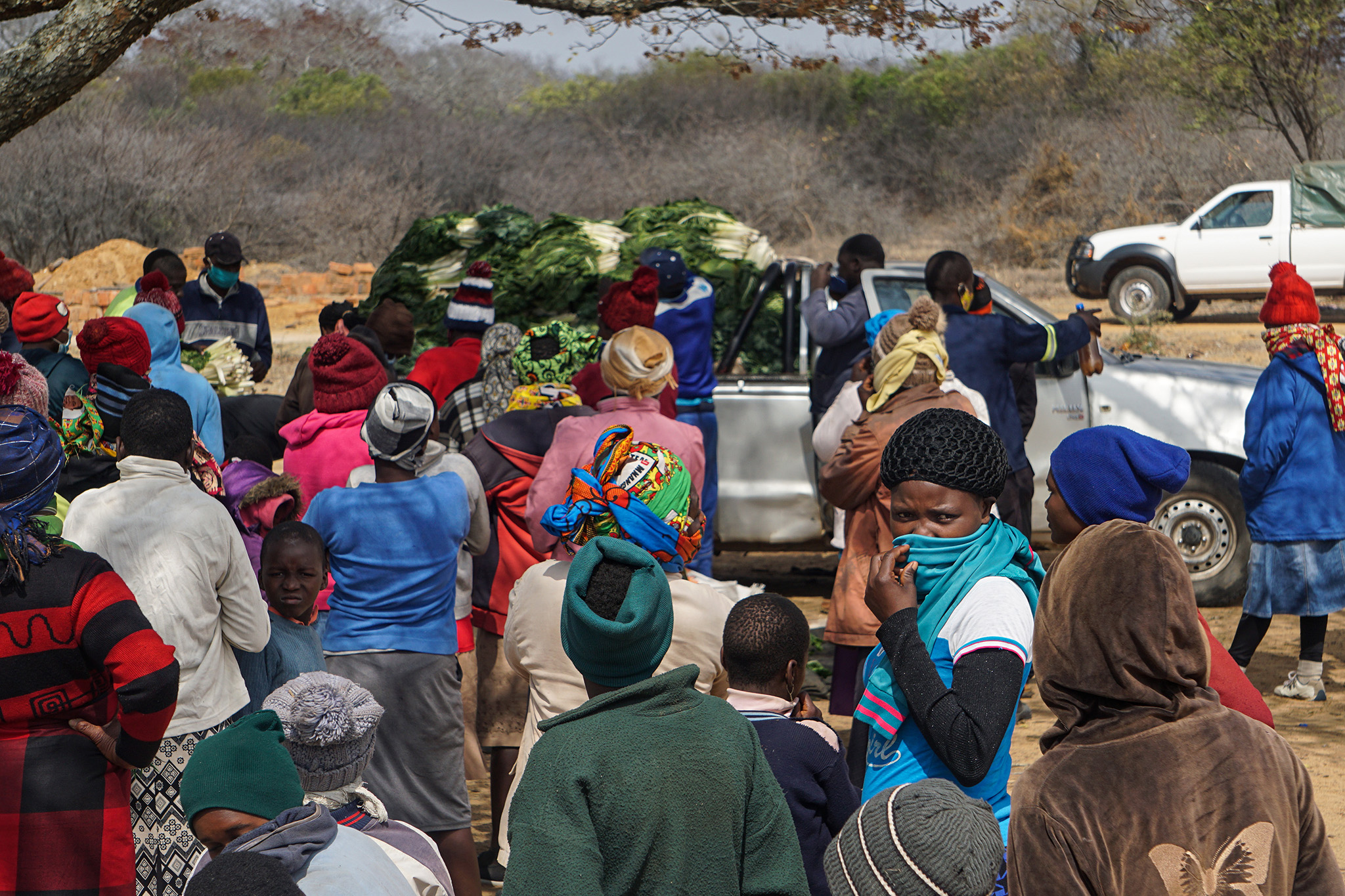
Linda Mujuru, GPJ Zimbabwe
Harare resident Lainah Matondora, a produce reseller, serves customers with her daughter, Vimbai Chiyambiro. The pandemic forced farmers to find new ways to do business. Mutoko growers no longer rely only on traveling to the Harare market to sell their fruits and vegetables.
MUTOKO, ZVISHAVANE, ZIMBABWE — In Siyadola, a village in south-central Zimbabwe, a crowd lugging buckets of grain hustles to line up one morning as Sebastion Muranga’s single-cab truck arrives bulging with produce.
Muranga has been to Siyadola only a few times. And the villagers, who usually buy produce in nearby towns, only recently started trading their grain.
This morning, the excited farmers in Siyadola, near the small mining town of Zvishavane, exchange sorghum, maize and sunflower seeds for Muranga’s tomatoes, onions, cabbages and more. He, meanwhile, is pleased to have found a fresh market for his fruits and vegetables.
Since March, the coronavirus has battered Zimbabwe, where up to 70% of its nearly 15 million people rely on the country’s fertile fields for food and income.
But the crisis also was a boon, as it forced farmers to try a different way of doing business — potentially transforming the agriculture sector by opening new markets and stabilizing growers’ earnings.
“This is such a relief,” says the stout, exuberant Muranga, who left mining work nearly two years ago for farming and now participates in a bartering network. “The coronavirus has been a double-edged sword for us. We had huge losses, but we also discovered a new market, and a new way of trading which is now part of our business plan going forward.”



The coronavirus’s arrival caused a national lockdown, featuring a host of orders, including travel restrictions and limited opening times for nonessential businesses.
The travel directives kept farmers from their markets, and they had to work fewer days and hours. Sales tumbled.
In the Zvishavane-Mberengwa Horticulture Farmers Association, farmers collectively lost over 10,000 cabbages valued at $6,000. Crates of tomatoes, which usually sell for as much as $24, went for as low as $3.
Muranga, 38, says such conditions pushed him and other farmers into bartering. He now does trade with four village markets, and each one needs 1 ton of tomatoes each week.
In Mutoko, an area in eastern Zimbabwe 500 kilometers (310 miles) north of Zvishavane, stakes of ripe tomatoes and leafy vegetables usually line the roadside. Early in the pandemic, Sydney Nyatsine and other local farmers in a cooperative watched their income wither.
“Most of our produce rot with nowhere to sell them,” says Nyatsine, 52, a father of four who grew tomatoes, butternut squash and other vegetables.
Desperate, they changed their ways. Now they dry tomatoes and leafy vegetables, and sell dried onions – at 20 to 30% more profit, Nyatsine says.



Peter George Chikowera, a father of five, farms on 2 acres (around 8,000 square meters) of land in Mutoko passed down from his parents. Before the pandemic, he says, he sold up to 15 crates of tomatoes and 50 bundles of leafy vegetables on each of his twice-a-week trips to Harare.
After the lockdown, he sold fewer than 20 bundles of vegetables and five crates of tomatoes.
That was in part because coronavirus restrictions kept him from Mbare, a Harare suburb that’s also home to a vast, usually vibrant trading market for fruits and vegetables. It was the go-to place for most Mutoko growers.
Today Chikowera, 48, dries some of his produce and grows other crops such as okra, pepper and cucumber, vegetables for which he has plenty of customers in Mutoko.
“We were forced by the disease to change how we used to sell our products,” Chikowera says. “Otherwise we wouldn’t be able to continue farming.”
Francis Pawandiwa, program coordinator for Nyahunure Community Trust, a community-based organization in Mutoko, says the coronavirus compelled many Zimbabwean farmers to shift strategies.
“[Farmers] have resorted to adding value,” such as selling dried produce, says Pawandiwa. “They can [now] supply even when the crops are not in season.”
These changes defy how Mutoko farmers worked in the past. Research by Mercy Corps Zimbabwe, an aid and development organization, found that Mutoko’s small-scale growers, known as market gardeners, were inconsistent suppliers to the Mbare Musika market.
The problem? They often didn’t have reliable transport.
As a result, the study says, “they often got stranded on the roadside with boxes of tomatoes and piles of other vegetables,” exposing themselves to losses from theft, car accidents and spoiled vegetables.
Not everyone likes all this change.
Back in Siyadola, Webster Vatakati, area youth chairman for the Zimbabwe African National Union Patriotic Front, the country’s ruling party, says farmers such as Muranga put people’s lives at risk.
“We were surprised to see people crowding here waiting for some people with produce from the town,” he says. “There’s coronavirus, and these people may bring it here.”
He also worries that by trading grain for vegetables, villagers are shortchanging themselves.
“These people are trading a long-lasting product for perishable goods,” he says. “In the long run, this will come to bite them.”
No matter: Muranga says he won’t go back to his old ways.
“We have been doing our best to keep up with the health protocols, so I don’t think there should be concerns that we would spread the virus to this community,” he says.
“Barter trade will now be a part of our medium-term growth model.”
Linda Mujuru is a Global Press Journal reporter based in Harare, Zimbabwe. She specializes in reporting on agriculture and the economy.
Vimbai Chinembiri is a Global Press Journal reporter based in Zvishavane, Zimbabwe. She specializes in reporting on Zimbabwe’s extractive industries.
Translation Note
Linda Mujuru, GPJ, and Vimbai Chinembiri, GPJ, translated some interviews from Shona. Click here to learn more about our translation policy.








